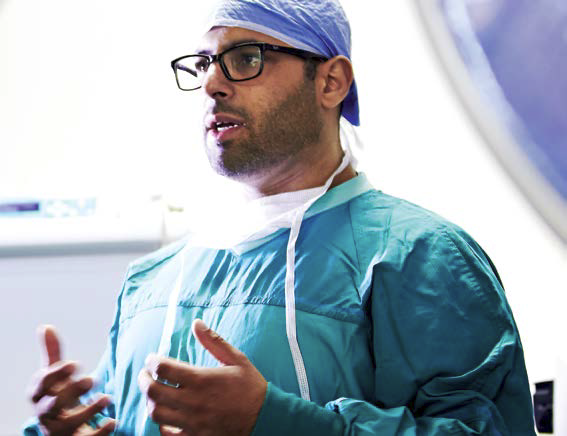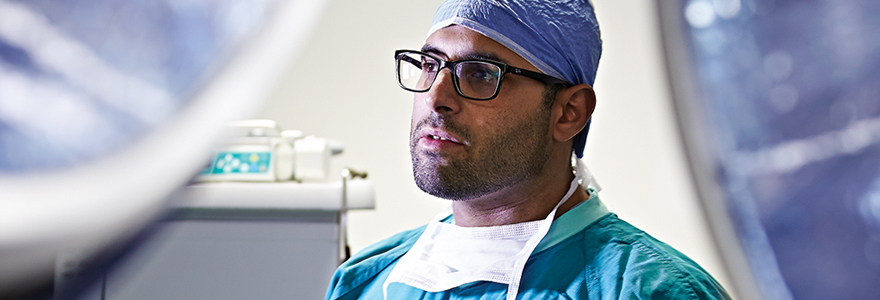Making change
With a philosophy of life to focus on solutions, Dr. Abdel-Rahman Lawendy is making change to better the lives of learners, his patients, and people around the world in crisis
By Jennifer Parraga, BA'93
Dr. Abdel-Rahman Lawendy, MD’03, PhD’14, gripped the edge of the unstable park bench in the back of a Volkswagen van, as it sped through the cover of darkness toward the Croatian border. The bombed out city of Sarajevo, under siege once again, grew smaller in the distance.
Waves of nausea hit him, as the van travelled more than nine hours through the unforgiving mountainous terrain. They stopped at checkpoints; just long enough for Dr. Lawendy to reach out his hand to cup some mountain water to replenish his system.
It was 1994 and the height of the Bosnian war. Dr. Lawendy was 18 years old at the time, working with Mercy International as part of a United Nations sponsored initiative. He had entered an essay contest and received the opportunity to travel to Sarajevo to assist with the relief efforts. Young, idealistic and feeling invincible, he didn’t hesitate.
He never imagined, however, the reality of what was actually taking place. The devastating images of children, dirty and hungry, remain with him today. “You learn about war in history class when you are going to school,” he said, “but it seems distant and obscure. This was an aggressive, violent destabilization of all infrastructure and civil society.”
This was Dr. Lawendy’s first humanitarian mission. The experience had such an impact on him that, two years later, he and a friend cycled across Canada to raise funds for Mercy International. “We travelled from Newfoundland to British Columbia and raised $20,000, which at the time, seemed like a lot of money,” he said with a thoughtful smile.
In 2005, during his residency, Dr. Lawendy and two of his fellow residents travelled to Balakot, Pakistan, situated in the Himalayan Mountains to provide front-line care following the devastating earthquake.
The missions have continued. In 2009, he travelled to Gaza as part of an international medical team and worked in a hospital during the 23-day Israeli attack.
Most recently, he spent a full month in Yemen with Médecins Sans Frontières (MSF)/ Doctors Without Borders, working in a hospital dedicated to treating victims of violence.
Soft spoken, and almost serene, Dr. Lawendy is very pragmatic about the missions he undertakes.

“When you see people in severe calamity, most people want to help solve the problem. It’s about applying a skill you have to help people - on an individual level it’s a very basic but effective approach.” - Dr. Abdel-Rahman Lawendy
He believes that the media steadily advance a narrative focused on problems with no solutions, which in turn creates apathy. He would rather focus on solutions. “When you see people in severe calamity, most people want to help solve the problem. It’s about applying a skill you have to help people—on an individual level it’s a very basic but effective approach.” It’s a philosophy he has applied to his own career and the rest of his life.
As an orthopaedic surgeon with specialty training in trauma surgery, Dr. Lawendy definitely has a skill to share. It’s one he developed through many years of training at Schulich Medicine & Dentistry.
Dr. Lawendy first encountered Schulich Medicine when he had the good fortune to work with Drs. Cec Rorabeck and Robert Bourne during a co-op placement. While studying medicine was not really part of his original plan, he was encouraged by the renowned surgeons to apply to medical school.
Medical school was a completely different world for the young student who describes his approach to his studies as less than disciplined. “The challenge of medical education is not in the understanding of concepts or principles but rather it’s the volume of knowledge that you need to have mastery over.”
Despite the workload, Dr. Lawendy has great memories of medical school. “It was a remarkable time,” said Dr. Lawendy, who describes his class as tight and socially conscious. “As a class we felt strong and empowered; we knew we had a place in the School,” he said recalling the issue of tuition increases which came about during his undergraduate years. His class challenged the plan to increase tuition rates in the medical school, fearing that medical education could become exclusive and elitist.
The intense curriculum, specifically during his clerkship, inspired him to stay at Schulich Medicine for his residency.
It was during his residency that he began his PhD in medical biophysics. Dr. Lawendy successfully defended his thesis in November 2014, describing the whole experience as a difficult balancing game. “When I started at Western I underestimated the clinical and teaching demands of running a trauma practice, training residents and medical students, while competing for research grants and running a lab,” he said. “At one point it seemed almost insurmountable to me. It took a discipline that I didn’t have, and a whole restructuring of my approach to work.”
It was through this challenge that Dr. Lawendy imagined a solution for those individuals who wanted to pursue a more intensive research path during their surgical residency: the Master of Science in Surgery Program. Today, he is the Chair of the program.
Dr. Lawendy’s research focuses on the study of the pathophysiology of compartment syndrome. The syndrome usually results from bleeding or swelling after an injury. The dangerously high pressure in compartment syndrome impedes the flow of blood to and from the affected tissues.
He and his team are trying to better understand the mechanisms that lead to the syndrome and determine if there is a drug which can expand the surgical window and salvage the muscles. They have patented a drug through World Discoveries and continue to work toward a solution.
An award-winning professor, Dr. Lawendy values his relationship with his students, noting how he continues to learn from them. “While I’m teaching students about technical skills of surgery, I’m also learning from them, as they offer creative solutions that I have not considered, for difficult problems.”
“During medical school you meet such different personalities,” said Dr. Lawendy. “You find people who will be problematic and people who you just know will alter the course of the field.” With a philosophy to focus on solutions instead of obstacles, Dr. Lawendy is altering medical education and care in Canada and around the world.









